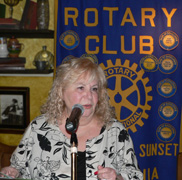Foster Children Resource Project


Gina Radocchio Lemor Warzman
Gina Radocchio of the California Federation of Women's Clubs (www.cfwc.org) thanked our Club and our Interactor Club for supporting their Foster Children Resource Project by contributing 564 luggage items for Los Angeles foster children. These children often have only a plastic garbage bag to carry their belongings in when they are transferred to a foster home. They also need clothing and personal items. All money donated to her organization goes to help children. There are 68 clubs in the Los Angeles County area working with other nonprofit organizations to make a difference.
Supporting the needs of foster children is a major mission for her organization, because these children suffer emotional problems from being uprooted and having no family to belong to, and some of them have also suffered physical, sexual and emotional abuse. They start life with a handicap and are at high risk for future unemployment, homelessness, mental illness, drug abuse and criminal involvement.
Lemor Warzman, of the Los Angeles County Department of Children and Family Services (http://dcfs.co.la.ca.us/), discussed the problems of children who have to be removed from their homes and enter a foster home for a variety of reasons. They are eventually either returned home if the situation there is considered safe and healthy for them by social workers, or placed for adoption. These children want to belong and to have dignity and a normal life, like other children.
They have independent living programs starting at age 14, to help them learn basic adulthood skills and get job training. Some are able to go on to college. Some of them excel, but others become homeless, mentally ill or criminal. Some cannot function in a normal home and need a more structured environment. The adoption rate is higher for younger children, but all foster children are more difficult to place for adoption because of perceived behavioral problems. Social workers are required to see foster children in their home environment once a month. All foster parents are screened and supervised. Occasionally, serious problems are missed until they get into the news media. The Department keeps statistics on its children over 18 to track their outcomes after its jurisdiction ends.